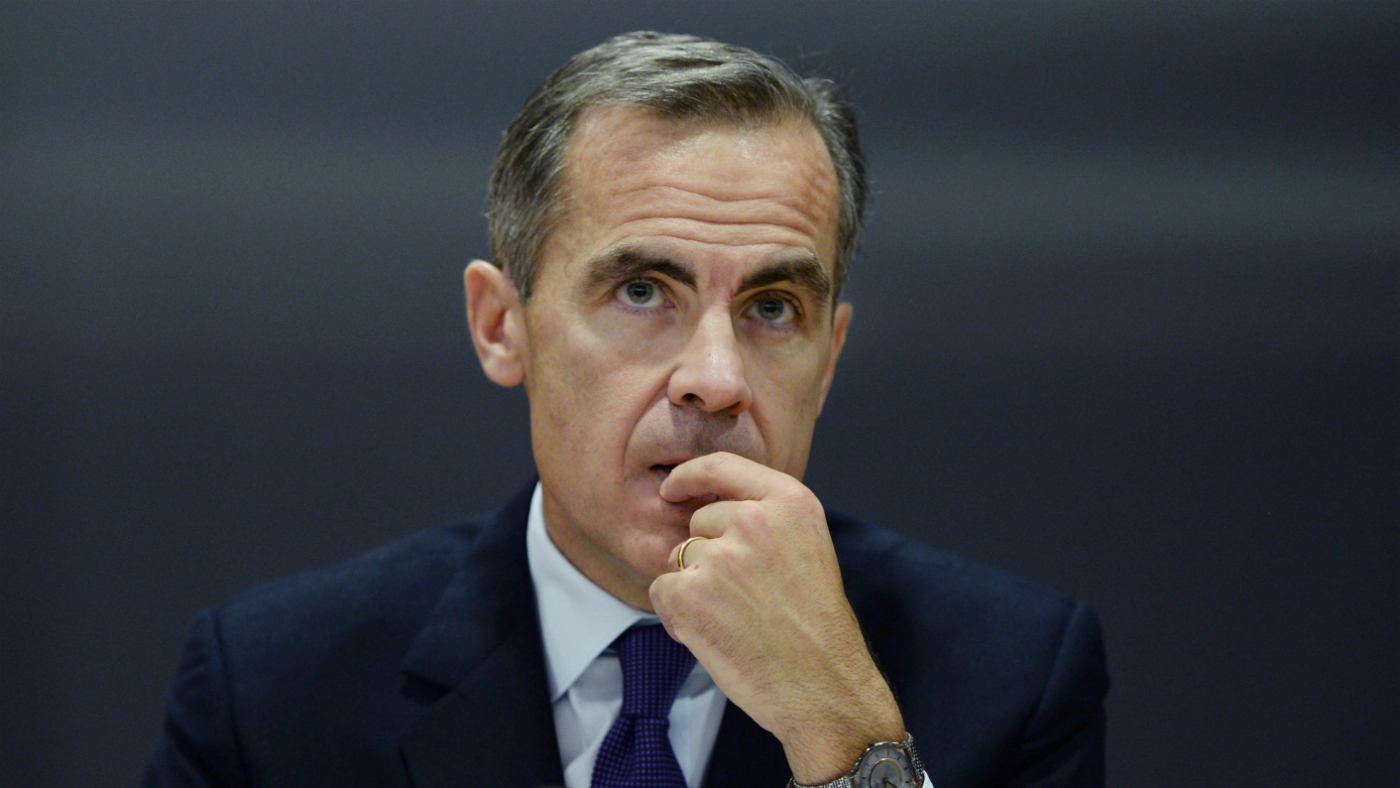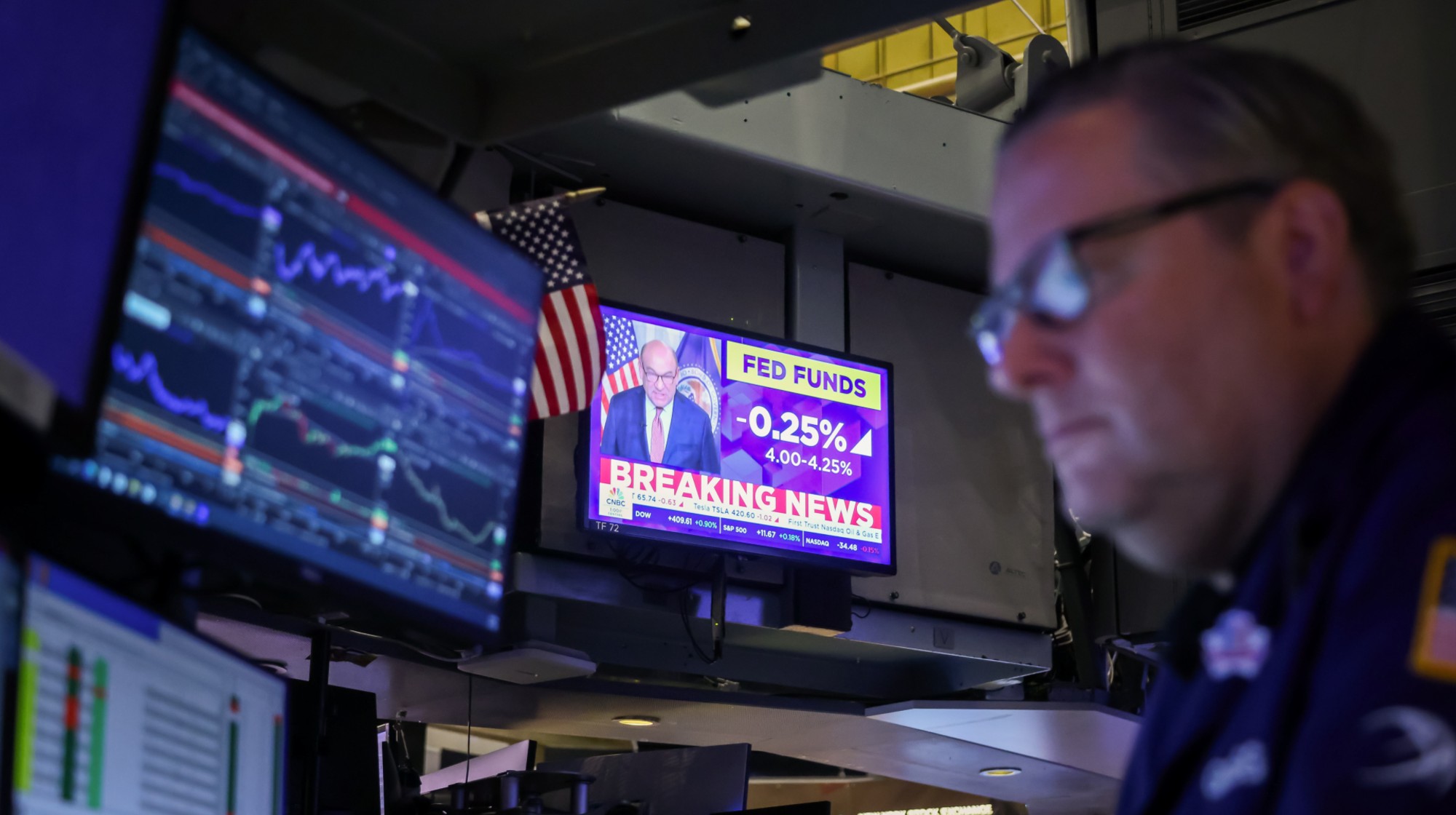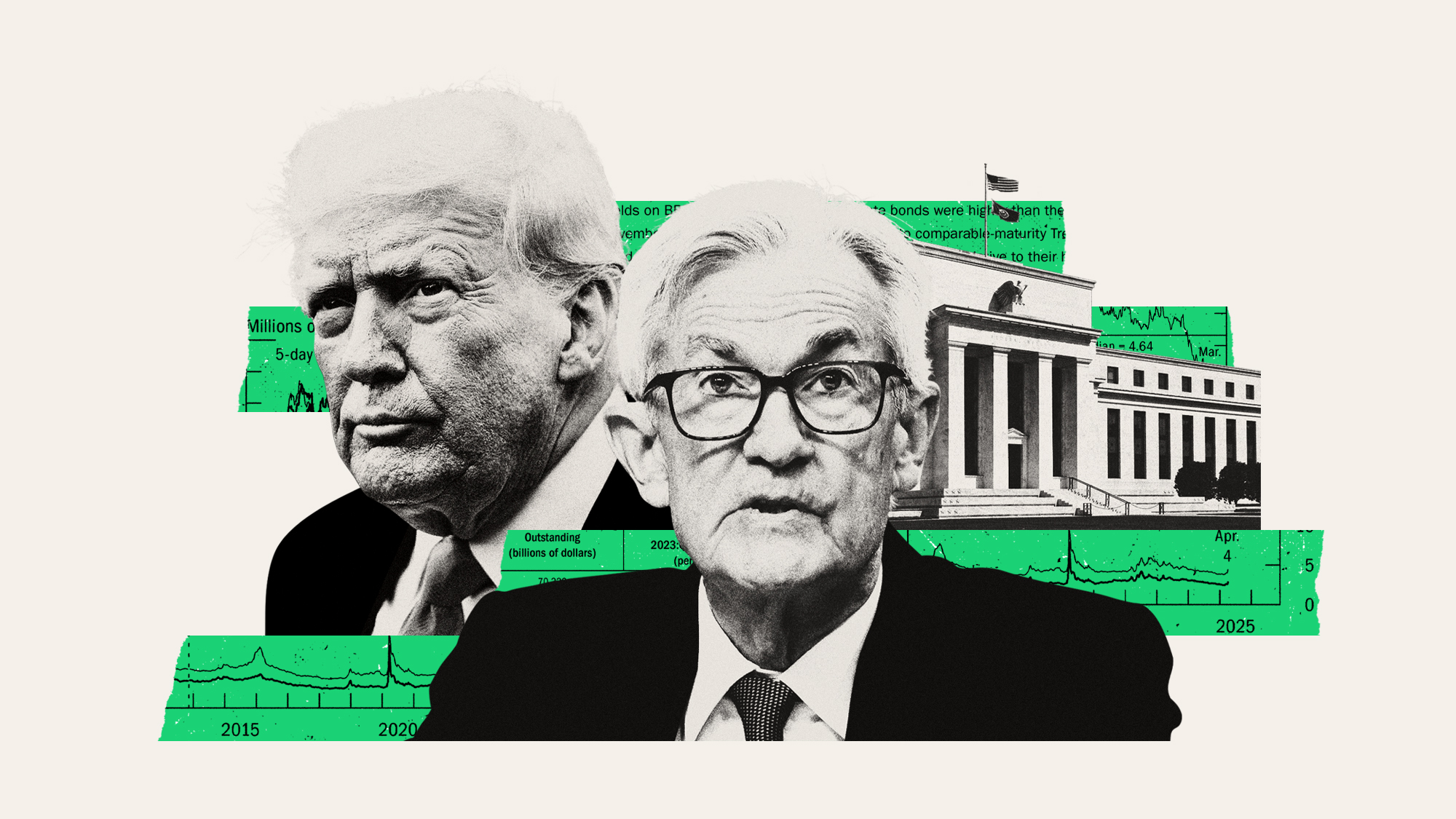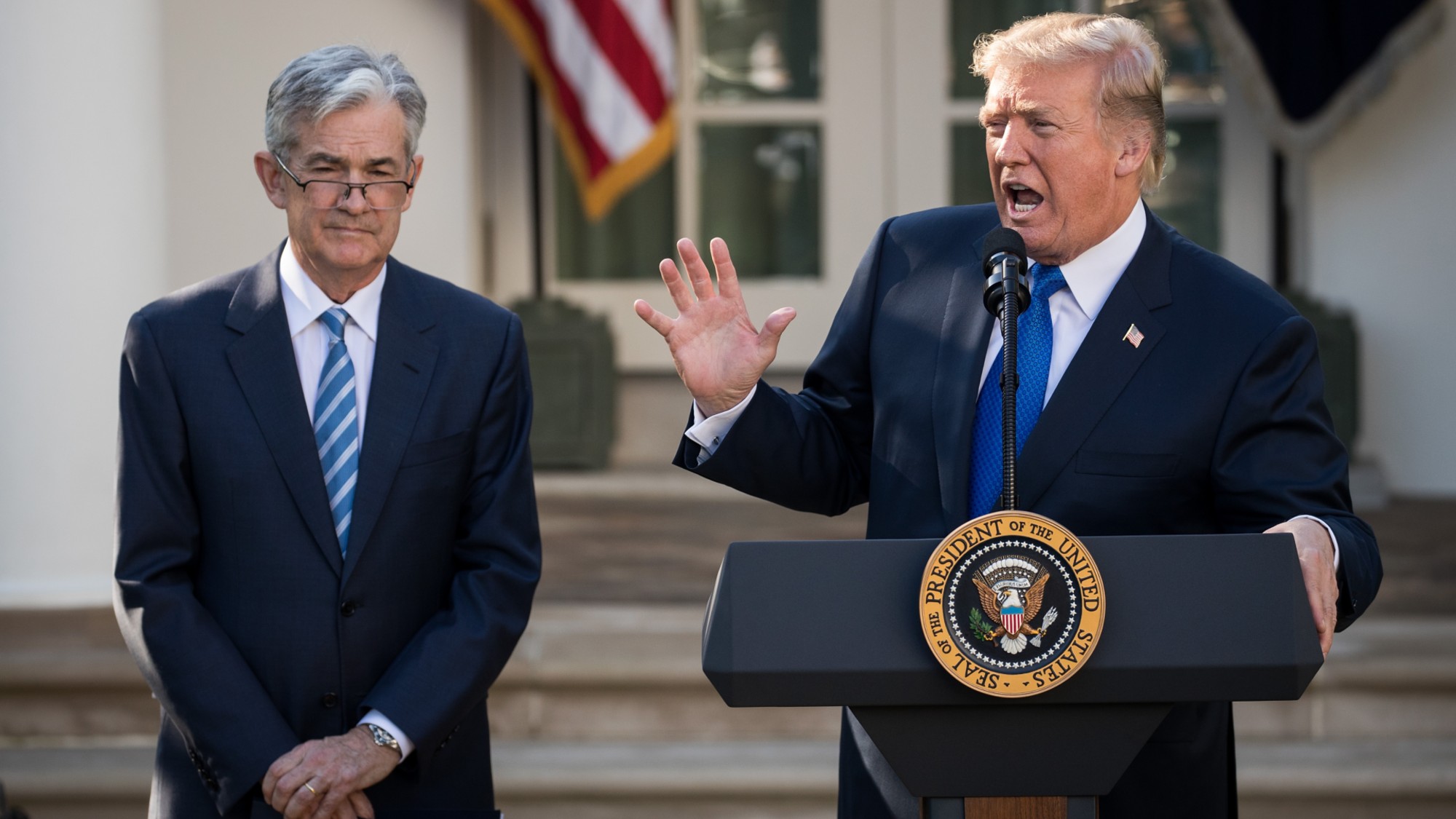Pound plunges after Bank of England's dovish rates signal
Central bank revises its growth forecast for UK economy

A free daily email with the biggest news stories of the day – and the best features from TheWeek.com
You are now subscribed
Your newsletter sign-up was successful
Bank of England cuts interest rates to record low
4 August
Bank of England rate-setters have voted to cut the already record-low UK base interest rate by a quarter of a percentage point to 0.25 per cent.
The Monetary Policy Committee (MPC) has set a new nadir in the 322-year history of the central bank. An all-time low was also set when rates were cut to 0.5 per cent in March 2009, where they have remained ever since.
The Week
Escape your echo chamber. Get the facts behind the news, plus analysis from multiple perspectives.

Sign up for The Week's Free Newsletters
From our morning news briefing to a weekly Good News Newsletter, get the best of The Week delivered directly to your inbox.
From our morning news briefing to a weekly Good News Newsletter, get the best of The Week delivered directly to your inbox.
The bank has also voted to expand its quantitative easing programme by £60bn. QE involves creating, or "printing", money to buy bonds issued by banks, in theory increasing the money they have to lend into the real economy.
This programme has also been extended to the corporate sector and a further £10bn worth of debt issued by other companies will be acquired to boost wider liquidity.
Finally, the bank has launched a £100bn scheme to offer cheap financing for banks to lend to small businesses. This will also act to protect their profit margins, which have come under pressure because of low headline rates.
Stimulus had been widely expected as the bank looks to counter a sharp slowdown in the economy post-EU referendum. Activity surveys yesterday pointed to the potential for the UK to suffer "at least a mild recession".
A free daily email with the biggest news stories of the day – and the best features from TheWeek.com
In its own updated growth forecasts, also published today, the bank said it still expects growth this year of two per cent, but believes this will slow to 0.8 per cent next year, down from 2.3 per cent.
The pound slumped by 1.5 cents against the dollar to $1.315 straight after the decision, while the FTSE 100 has surged from a modest loss to a one per cent gain.
The Guardian says this "suggests that the Bank of England has gone further than traders had expected".
Ultra-low interest rates have been criticised for everything from depressing savings rates and inflating a housing "bubble", to effectively dragging down annuity pension income rates.
According to the i newspaper's Elizabeth Anderson, a typical pensioner with £100,000 in savings would get more than a third less income per year than back before rates were cut to their record low.
Quantitative easing, which has the effect of driving down bond yields, is also cited as a potential drag on annuity rates, which are based on returns available from government gilts.
Is an interest rate cut today a 'foregone conclusion'?
04 August
A cut to base borrowing costs by rate-setters at the Bank of England later today is now inevitable, according to the business information provider Markit.
Chris Williamson, the firm's chief economist, told the BBC that a 0.25 per cent cut to the already record-low base interest rate of 0.5 per cent was almost certain to be announced following a meeting of the Bank of England's Monetary Policy Committee (MPC).
His comments came as Markit published the third of its post-Brexit purchasing managers' index surveys, which measures UK business confidence in order to make economic forecasts, this time on the services sector that dominates the UK economy.
It shows a marked slowdown after the Brexit vote, from a reading of 52.3 in June to 47.4 in July, a drop that's below the 50 threshold that separates expansion from contraction. Like the fall in manufacturing and construction activity that Markit reported earlier this week, the figure is the lowest for seven years.
Taken together, Williamson says the responses point to negative growth of 0.4 per cent for the third quarter, although this would depend on business sentiment not improving this month or next.
"The unprecedented month-on-month drop in the all-sector index has undoubtedly increased the chances of the UK sliding into at least a mild recession," he says. "A quarter-point cut in interest rates therefore seems to be a foregone conclusion."
Mr Williamson adds that the "extent and nature of other non-standard stimulus measures remain a far greater source of uncertainty".
The Guardian's economics editor Larry Elliott says this morning that the range of options for action includes, alongside a rates cut, an expansion in quantitative easing bond purchases, re-opening the funding for lending scheme that offers cheap financing for banks, or handing money out more directly in a process known as "helicopter money".
Whether or not the Bank of England should go ahead and lower rates is more contentious.
A 'shadow MPC' for The Times called yesterday for rate-setters to "do nothing" and instead recommend that the government cuts taxes or increases spending on infrastructure in a bid to stimulate growth.
The group of former policy makers is concerned that a cut to rates, or other measures such as buying bonds, will do little to stimulate growth and could even hurt the economy by driving up prices.
"The negative shock to the economy post-Brexit is a political and structural shock – not a monetary shock. As such it requires a political and structural response," says Andrew Sentance, a former rate-setter.
Savers already being hit by expected interest rate
02 August
A further cut to interest rates is already hitting hard-pressed savers - before it has even happened.
According to data provider Moneyfacts, financial institutions withdrew 13 of the market's "best buy" savings accounts during July and have not replaced them, reports The Guardian.
Among them were a 1.8 per cent savings bond offered by Saga, one and two-year Isas from Virgin Money and the Post Office's market leading three-year bond.
With big names disappearing and rates on offer from the high street stalwarts mostly underwhelming at best, money had been flowing into smaller players. However, that brings pressure at a time when the low base rate is squeezing margins and they too are beating a retreat.
Among the regional building societies to withdraw various top-paying deals in recent weeks are the Buckinghamshire, the Beverly and the National Counties, the Guardian adds.
"Small providers that would have never envisaged being market-leaders are slowly finding themselves near the top of the market," said Moneyfacts' Rachel Springall. "This has resulted in a vicious cycle of rate reductions… or indeed withdrawing the deal entirely."
Ever-poorer returns for already squeezed savers is one reason a prominent former rate-setter has advised the Bank of England's Monetary Policy Committee not to vindicate market expectations for a cut in the record low base rate from 0.5 per cent to 0.25 per cent or lower this Thursday.
Kate Barker, who served three terms on the committee and is now a non-executive director at the government's Office for Budget Responsibility, writes in The Times that savers "may be reluctant to reduce the capital value of their savings… [and] may cut back their spending".
This would hit the economy, while the benefits of lower rates on mortgage borrowers would be limited and subject to a lag effect as more than half of home loans are fixed-rate deals.
Moreover, says Barker, while low inflation and wage rates mean the risks arising from a resulting drop in the value of the pound are manageable, the negative impact of higher import costs on spending would be significant and would outweigh the benefit of cheaper exports.
In common with Lloyds Banking Group chief executive Antonio Horta-Osorio, Barker says the Bank of England should instead offer cheap bank loans to boost credit provision and that government spending should provide the real boost to the economy.
UK interest rate cut expected on Thursday
01 August
The Bank of England is widely expected to cut interest rates this week from their seven-year record low of 0.5 per cent.
The bank's Monetary Policy Committee publishes its latest decision on Thursday and all but three of 49 economists polled by Reuters expect it to cut borrowing costs to boost a flagging post-Brexit vote economy.
Most believe the reduction will be 0.25 per cent, but there are those who think the rate-setters will go further.
"We see little reason for the Bank of England to restrict itself to a 25 basis point rate cut in August, in terms of both the need for a larger policy response and the Bank of England’s ability to deliver one," Allan Monks, an economist at JP Morgan, told The Guardian.
In common with a number of experts, Monks believes the Bank of England will set the base rate at zero. Few expect it to follow central banks in Europe and Japan and move to negative ratesBeyond action on rates, there is less agreement on other stimulus measures the Bank might adopt.
Less than half of the economists surveyed by Reuters expect the quantitative easing bond-buying programme to be restarted. Among those who think it will, there are predictions of anything from £50bn to £550bn of new purchases.
Quantitative easing is the process of creating money to buy debt issued by high street banks, which in theory gives them more money to lend into the real economy to boost growth.
Critics say the process is ineffective, with some saying the bank could instead opt for an alternative called "helicopter money".
This similarly involves "printing" new money, which is then either used to buy government bonds to fund infrastructure projects or else handed directly to citizens to boost their spending power. It’s seen as a drastic option that has been avoided around the world so far.
Another choice could be for the bank to announce it is reopening its Funding for Lending scheme, which enabled high street to borrow central bank funds cheaply to lend for specific purposes, such as to small businesses.
Policy action would come in response to data pointing to a sharp slowdown in growth in the third quarter in the wake of the vote for Brexit.
The Bank of England's inflation report, also published on Thursday, is expected to slash its forecast for 2016 economic expansion from 2.3 per cent to less than one per cent, the biggest downgrade since it become independent in 1997.
Has Fed opened the door to interest rate rise in September?
28 July
A gradual end to ultra-accommodative monetary policy in the world's largest economy could be in store following last night's upbeat message from the US Federal Reserve.
Ending its latest two-day meeting, the central bank's rate-setting Open Markets Committee issued a statement that "opened the door to an interest rate increase later this year, possibly as early as September", says the Wall Street Journal.
As had been widely expected, the Fed kept rates on hold this month. They've been unchanged since a modest rise to 0.5 per cent in December.
That was the first increase in nearly a decade and in the seven years since base borrowing costs were dramatically cut to boost the economy after the financial crisis.
Since December, the Fed has insisted rates will be on a gradual upward path, but last month, after a weak jobs report in May ended remarkable labour market expansion – and ahead of the important referendum vote in the UK – policymakers appeared to turn dovish.
However, last night, the committee said these downside risks had "diminished".
The jobs market added 287,000 roles in June, "at least 100,000 more than experts had forecast", reports the Financial Times. US markets have risen to record highs since the UK voted to leave the EU, while latest US GDP data has also shown a modest improvement.
The WSJ says the language on future risks is important, as it sets the context for the policy decisions.
"When it sees risks that the economy will be weaker than forecast, it tends to keep rates on hold or lowers them. The Fed was silent on risks for the last two meetings, an indication officials weren’t sure how to proceed," it says.
"By saying risks have diminished, it appeared to be indicating a rate increase is possible, though not certain, in the months ahead."
Based on Fed forecasts, market expectations remain for two more rate increases this year, says the BBC. With only three meetings left - one of which, in November, is unlikely to see a change as it coincides with the US presidential election - many believe a September hike is now on the cards.
Before that meeting, though, there are two more reports on the jobs market and an estimate on second-quarter GDP, which will set the tone. This also explains why the Fed wasn't more definite.
JP Morgan economist Michael Feroli said Wednesday’s statement was a "baby step" toward future rate increases. He still predicts the next increase will come in December, unless there are "blockbuster employment and inflation data to make September a realistic possibility".
-
 The ‘ravenous’ demand for Cornish minerals
The ‘ravenous’ demand for Cornish mineralsUnder the Radar Growing need for critical minerals to power tech has intensified ‘appetite’ for lithium, which could be a ‘huge boon’ for local economy
-
 Why are election experts taking Trump’s midterm threats seriously?
Why are election experts taking Trump’s midterm threats seriously?IN THE SPOTLIGHT As the president muses about polling place deployments and a centralized electoral system aimed at one-party control, lawmakers are taking this administration at its word
-
 ‘Restaurateurs have become millionaires’
‘Restaurateurs have become millionaires’Instant Opinion Opinion, comment and editorials of the day
-
 Powell: The Fed’s last hope?
Powell: The Fed’s last hope?Feature Federal Reserve Chairman Jerome Powell fights back against President Trump's claims
-
 The end for central bank independence?
The end for central bank independence?The Explainer Trump’s war on the US Federal Reserve comes at a moment of global weakening in central bank authority
-
 Who will be the next Fed chair?
Who will be the next Fed chair?Today's Big Question Kevin Hassett appears to be Trump’s pick
-
 Should Labour break manifesto pledge and raise taxes?
Should Labour break manifesto pledge and raise taxes?Today's Big Question There are ‘powerful’ fiscal arguments for an income tax rise but it could mean ‘game over’ for the government
-
 What are stablecoins, and why is the government so interested in them?
What are stablecoins, and why is the government so interested in them?The Explainer With the government backing calls for the regulation of certain cryptocurrencies, are stablecoins the future?
-
 Fed cuts interest rates a quarter point
Fed cuts interest rates a quarter pointSpeed Read ‘The cut suggests a broader shift toward concern about cracks forming in the job market’
-
 Trump's threats to fire Jerome Powell are unsettling the markets
Trump's threats to fire Jerome Powell are unsettling the marketsTalking Points Expect a 'period of volatility' if he follows through
-
 How will Wall Street react to the Trump-Powell showdown?
How will Wall Street react to the Trump-Powell showdown?Today's Big Question 'Market turmoil' seems likely